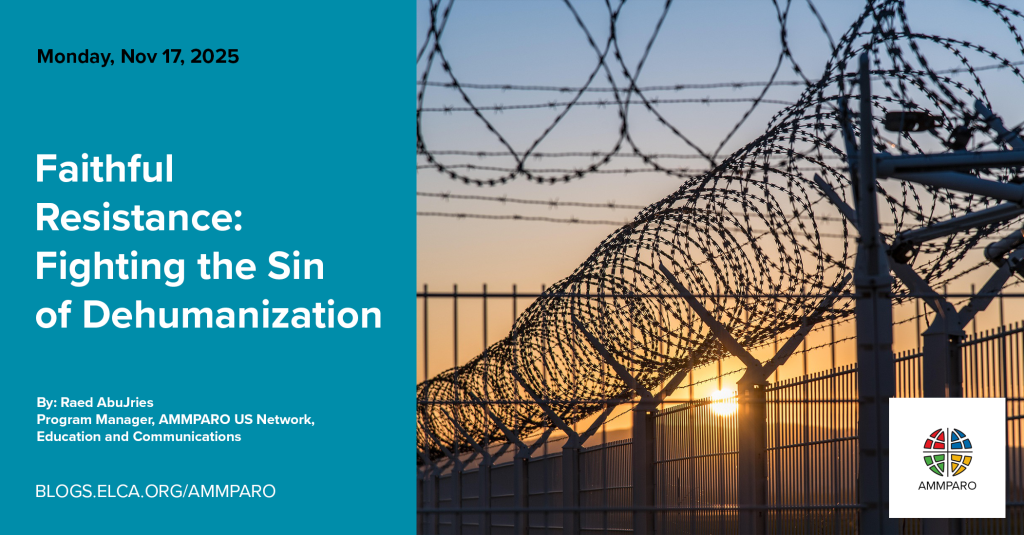They are hard to miss. “Invasion“, “Animals“, “Illegals” … We hear these words all the time, whether on the news or in the comment section, used to describe migrants and other marginalized groups.
These words are used for a reason. They are designed to make us afraid, to make us numb, and to make us see a “problem” instead of a person. They build walls between “us” and “them.”
As people of faith, we have to be honest: this isn’t just a political debate. It’s a spiritual one. The way we talk about and treat the marginalized is a gut-check for our faith. When we see people being systematically dehumanized, we are called to do more than just feel bad. We are called to resist.
This hits at the very heart of our faith. The first thing the Bible tells us about humanity is that every single person is made in the image of God.
“So God created mankind in his own image,
in the image of God he created them;
male and female he created them.” (Genesis 1:27)
This isn’t a status we earn by having the right passport, the right skin color, or the right amount of money. It is a gift, given to every single human being. The person in a shelter, the family seeking asylum, the child at the border—they are all, right now, image-bearers of God.
The apostle James gives us a powerful warning about this. He calls out the hypocrisy of using our words for both praise and poison:
“With the tongue we praise our Lord and Father, and with it we curse human beings, who have been made in God’s likeness. Out of the same mouth come praise and cursing. My brothers and sisters, this should not be.” (James 3:9-10)
This is our gut-check. We can’t claim to love God and then stay silent when people made in His likeness are called “animals.” Resistance starts by recognizing that dehumanization is a direct attack on the image of God.
Calling Sin by Its Name
Let’s be clear: dehumanization isn’t just a “different opinion.” It’s a sin. It’s the sin of pride, the same sin that builds walls in our hearts and convinces us that we are more valuable than someone else.
The Bible warns against this again and again. It tells us that how we treat the poor and the outsider is a direct reflection of what we think about God.
“Whoever oppresses the poor shows contempt for their Maker,
but whoever is kind to the needy honors God.” (Proverbs 14:31)
When we “other” people, we show contempt for their Maker. Our resistance, then, isn’t just a political stance. It’s a spiritual act of defending God’s honor, which He has placed inside every person.
What Does Faithful Resistance Look Like?
“Resistance” can sound like a big, scary word. But in our faith, it’s an active, daily calling. It’s not just about what we are against; it’s about what we are for. It’s about rejecting injustice and embracing the way of Jesus.
Resistance with Our Words and Our Silence: This is foundational. We have to stop the spread of dehumanizing language in our own lives. When we are in a conversation and hear people described as “less than,” our silence can feel like agreement.
We don’t have to be confrontational, but we must be clear in our position. We resist by refusing to let the poison pass through us.
Resistance with Our Actions: “Love Others as Yourself” Our faith isn’t just a set of beliefs; it’s something we live out. God’s command was incredibly personal:
“You shall not wrong a sojourner or oppress him,
for you were sojourners in the land of Egypt.” (Exodus 22:21)
What God is saying is basically: “Don’t you dare forget what it felt like to be the outsider, to be the one who was scared and powerless.” He then takes it a step further, moving from “don’t harm” to “actively love”:
“The foreigner residing among you must be treated as your native-born.
Love them as yourself, for you were foreigners in Egypt.
I am the LORD your God.” (Leviticus 19:34)
This is a radical command. “Love others as yourself.” Resistance looks like doing this love. It’s volunteering at a shelter, donating to an aid organization, welcoming a new family, or advocating for fair and compassionate policies. It is, as the apostle John wrote, loving “with actions and in truth,” not just with “words or speech” (1 John 3:18).
Resistance with Our Hearts: The Fight Against Our Own Pride This is the hardest part. It’s easy to point fingers at the “bad guys” on TV. It’s much harder to resist the pride and fear in our own hearts.
The true path of resistance is humility. It’s the daily work of asking God to break down the “us vs. them” walls we build. It’s resisting our own comfort, our own fear, and our own temptation to look away.
This is the journey God calls us to. It’s the simple, powerful, and life-long command given by the prophet Micah:
“He has shown you, O mortal, what is good. And what does the LORD require of you? To act justly and to love mercy and to walk humbly with your God.” (Micah 6:8)
This is our calling. To resist dehumanization is to act justly. To see the person, not the label, is to love mercy. And to fight our own pride is to walk humbly with our God.
It’s not going to be easy, but the alternative is to deny the image of God in our neighbor, and ultimately, in ourselves.
By: Raed AbuJries
Program Manager, AMMPARO US Network, Education and Communications
raed.abujries@elca.org

